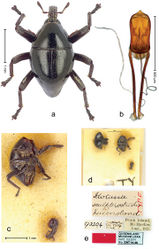Trigonopterus sculptirostris
| Notice: | This page is derived from the original publication listed below, whose author(s) should always be credited. Further contributors may edit and improve the content of this page and, consequently, need to be credited as well (see page history). Any assessment of factual correctness requires a careful review of the original article as well as of subsequent contributions.
If you are uncertain whether your planned contribution is correct or not, we suggest that you use the associated discussion page instead of editing the page directly. This page should be cited as follows (rationale):
Citation formats to copy and paste
BibTeX: @article{Riedel2016ZooKeys, RIS/ Endnote: TY - JOUR Wikipedia/ Citizendium: <ref name="Riedel2016ZooKeys">{{Citation See also the citation download page at the journal. |
Ordo: Coleoptera
Familia: Curculionidae
Genus: Trigonopterus
Name
Trigonopterus sculptirostris (Lea) – Wikispecies link – Pensoft Profile
- Idotasia sculptirostris Lea, 1928: 154–155.
- Trigonopterus sculptirostris (Lea): Pullen et al. 2014[1]: 271.
Diagnostic description
Lectotype (Fig. 28a). Length 2.24 mm. Color black. Body subovate, almost without constriction between pronotum and elytron; in profile evenly convex. Rostrum with sharp median ridge and pair of sharp submedian ridges; intervening furrows with rows of white scales; apical 1/3 rugose-punctate. Eyes with dorsal margin bordered by furrow. Forehead punctate. Pronotum with disk densely punctate with small punctures; sides sparsely shallowly foveate. Elytra subglabrous, striae marked rows of small punctures; humeri laterally with row of large punctures. Legs with sparse white scales; anteroventral ridge of pro- and mesofemur with acute tooth, metafemur with blunt tooth. Metafemur dorsally with sparse white scales; posterior surface with furrow containing row of scales parallel to ventral edge, subdorsally with row of coarse punctures. Tibial apex with uncus, without premucro. Abdominal ventrite 2 posteriorly costate resembling ventrite 3, anteriorly declivous to concave ventrite 1; ventrite 5 weakly concave, punctate, sparsely clothed with erect scales and setae. Penis (Fig. 28b) with sides of body subparallel, weakly concave; apex with median triangular extension confluent with outline of apex; transfer apparatus short, dentiform, supported by lyriform sclerite; ductus ejaculatorius without bulbus. Intraspecific variation. Length 2.14–2.80 mm. Female rostrum with dorsal ridges less distinct, only in basal half; apical 1/2 rugose-punctate. Female abdominal ventrites 1 and 2 medially flat; female abdominal ventrite 5 flat.
Material examined
Type specimens. Male, lectotype by present designation (Fig. 28) (QMBA): Queensland, Dunk Island, coll. H. Hacker, VIII-1927 (labels Fig. 28e), ARC4039 (PCR failed). Female, paralectotype (SAMA), same data as lectotype. Other specimens (ANIC, SMNK): Queensland: 10 exx, ARC3669 (EMBL # LN888170), ARC3670 (EMBL # LN888171), ARC3671 (EMBL # LN888172), Kuranda N.P., Saddle Mountain Road, S16°48.882', E145°38.870', to S16°48.559', E145°39.458', 380–475 m, 31-III-2014; 40 exx, ARC3681 (EMBL # LN888173), ARC3682 (EMBL # LN888174), ARC3683 (EMBL # LN888175), ARC3684 (EMBL # LN888176), Mission Beach, Clump Mt. N.P., Bicton Hill, S17°50.146', E146°06.023', to S17°50.499', E146°05.905', 36-240 m, 14-IV-2014; 5 exx, ARC3687 (EMBL # LN888177), ARC3688 (EMBL # LN888178), Djiru N.P., road between Mission Beach and El Arish, S17°52.053', E146°04.093', 75 m, 15-IV-2014; 2 exx, Julatten, edge of rainforest along creek, ex intercept trap, 20-X-21-XI-1987; 20 exx, ARC3756 (EMBL # LN888233), ARC3757 (EMBL # LN888234), ARC3758 (EMBL # LN888235), Daintree N.P., NW Mossman, Manjal Jimalji (Devils Thumb) trail, S16°23.653', E145°19.724', to S16°23.664', E145°18.531', 100-700 m, 20-IV-2014; 1 ex, Donovan Ck., S16°01', E145°27', 20 m, FIT D03F, 10-II-14-III-1998; 1 ex, ARC3861 (EMBL # LN888245), Mt. Finnigan, ascent from Shiptons Flat, S15°48.620', E145°16.329', to S15°49.043', E145°16.780', 700-1000 m, 28-IV-2014.
Distribution
Queensland: Mission Beach, Dunk Island; Kuranda, Julatten, Daintree N.P., Mt. Finnigan.
Biology
Beaten from foliage in rainforest.
Notes
Lea (1928)[2] did not designate a holotype in the original description nor specify the number of specimens examined. The original description is based on more than one specimen. One pair with the male marked “TY” could be examined but other specimens may exist. The male is here designated lectotype to ensure stability of nomenclature in case additional syntypes are discovered that belong to different species.
Taxon Treatment
- Riedel, A; Tänzler, R; 2016: Revision of the Australian species of the weevil genus Trigonopterus Fauvel ZooKeys, (556): 97-162. doi
Images
|
Other References
- ↑ Pullen K, Jennings D, Oberprieler R (2014) Annotated catalogue of Australian weevils (Coleoptera: Curculionoidea). Zootaxa 3896: 1–481. doi: 10.11646/zootaxa.3896.1.1
- ↑ Lea A (1928) Australian Curculionidae of the subfamilies Haplonycides and Cryptorhynchides. Transactions and Proceedings of the Royal Society of South Australia 52: 95–164.
